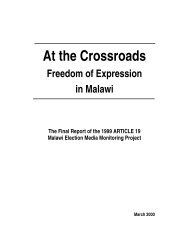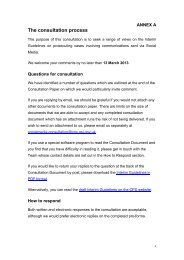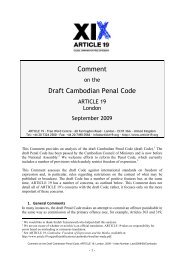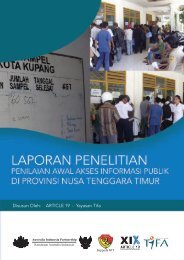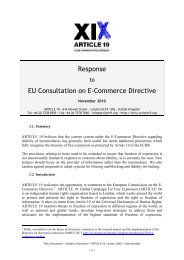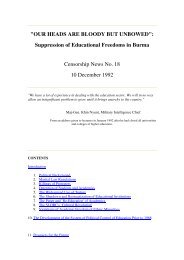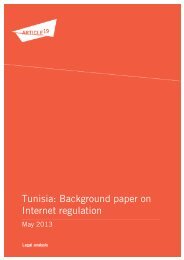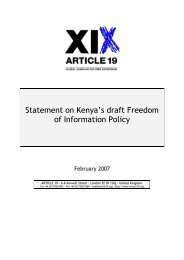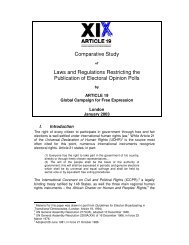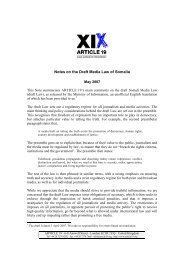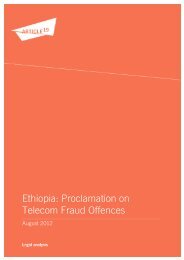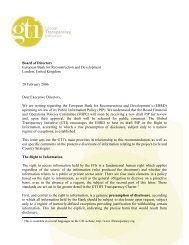FOR INTERNAL USE ONLY - Article 19
FOR INTERNAL USE ONLY - Article 19
FOR INTERNAL USE ONLY - Article 19
- No tags were found...
Create successful ePaper yourself
Turn your PDF publications into a flip-book with our unique Google optimized e-Paper software.
ARTICLE <strong>19</strong>GLOBAL CAMPAIGN <strong>FOR</strong> FREE EXPRESSIONFew media outlets and journalists actively investigate and report issues of environmentalconcern, especially when these are politically sensitive. 214 Although there a small number ofcommitted and professional environmental journalists, the majority of journalists prefer not to exposesensitive topics or criticise the authorities, for fear of reprisals. 215Another significant problem in this context is the difficulty journalists experience in obtaininginformation from public institutions. Often they are only provided with information when they havedemonstrated their loyalty to the authorities. In addition, many journalists lack sufficient knowledgeand skills and this undermines their capacity to insist on their right to information and to coverenvironmental issues professionally. Journalists often have some knowledge about the Law on theMedia but are not familiar with their rights under the Law on Information, the Law on EnvironmentalProtection, or international standards such as the Aarhus Convention. 216 There are limited trainingopportunities in investigative journalism and generally the level of professionalism is not high.9,& " " 9,&,* %A number of factors affect environmental transparency in Ukraine. These include: a lack of effectivepolicies and clear guidelines for providing information; the absence of political will to enhance thetransparency of institutions; and the lack of a tradition of dialogue between the authorities and thepublic.A draft “Strategy of National Environmental Policy of Ukraine” until 2020 was beingcompiled by the MEP in November 2007, and due to be to be submitted to the Cabinet of Ministers inJanuary 2008. The strategy’s Concept was adopted by the Cabinet of Ministers on 17 October 2007,following some input from civil society. 217 It defines principles of environmental policy, mechanismsfor their realisation, their monitoring and for indicators of success.Despite these efforts, overall Ukraine still does not have an effective State policy onenvironmental information, primarily because the protection of the environment is not seen as apriority. Former Prime Minister Victor Yanukovych’s government largely excluded natureconservation from its agenda. The governing coalition in power in 2007, like previous ones, seemed toview environmental concerns as a barrier to economic growth. This is reflected in the MEP’s poorperformance, as well as its very limited authority. Under existing regulations, a number of ministries214 Interview with Oleg Listopad, see note 82.215 Ibid216 Interview with Serhiy Varlamov, see note 209.217 Tetyana Tymochko (see note 49) was part of the working group which developed the Concept.For Internal Use Only. Is Post-Chornobyl Ukraine Ready for Access to Environmental Information?ARTICLE <strong>19</strong>, London, 2007&%



